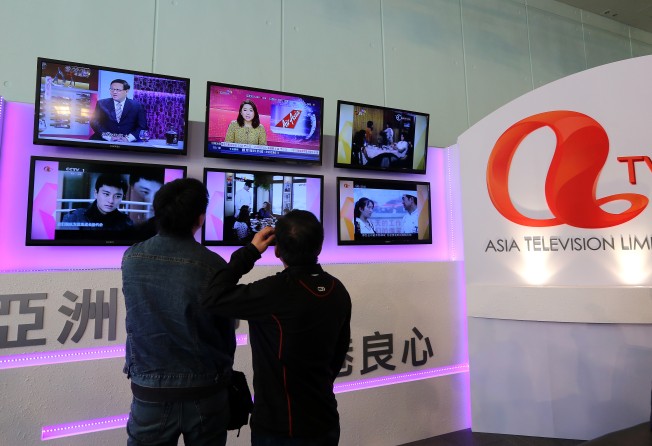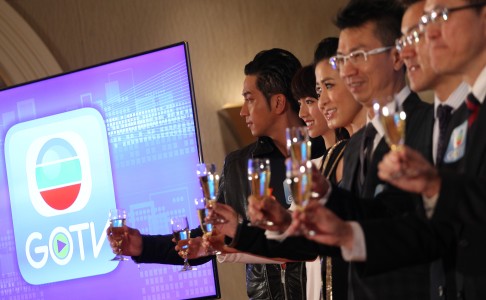The death of a duopoly: who wins and who loses after ATV's spectacular fall and TVB's rise

Hongkongers are used to duopolies. Every day, citizens choose blissfully between Wellcome and ParknShop, Café de Coral and Fairwood, Fortress and Broadway, oblivious and powerless to the glaring absence of choice.
This false sense of consumer freedom is legitimised by the government’s corporate propaganda telling us that too many options can lead to confusion, cutthroat competition and an economic apocalypse.
Nowhere is this phenomenon more pronounced than in the realm of free-to-air television – broadcasting that requires no paid subscription and commands high viewership especially among the low income demographics.
Our television dial can only toggle between the complacent TVB and the languishing ATV, two unequal adversaries that nowadays offer numb viewers the Hobson’s choice between bad programming and the unwatchable.
For months, ATV – the world’s first Chinese-language television station – has been dying a slow and torturous death. Its financial troubles first surfaced last autumn when staff complained about unpaid wages.
Senior management resorted to stalling tactics and made up stories about new funding and white knights. And when desperate times called for desperate measures, the cash-strapped broadcaster cut its programming to the bone, liquidated assets from copyrights to camera equipment, and even begged key shareholders to offer loans to employees in lieu of pay.
All that buffoonery, almost too painful to watch, culminated in a death sentence last Wednesday when the government announced its unprecedented decision not to renew ATV’s license. The announcement came a day after management broke the camel’s back by releasing false information on a prime time news programme that Ricky Wong, owner of HKTV, had agreed to a buyout.
Most people welcome the government’s move to put the struggling broadcaster out of its misery. Even before the recent series of unfortunate events, ATV had long been a glorified placeholder in the public airwaves – an ugly sister that no one bothered to cast an eye over.
The butt of jokes we know today is a far cry from the drama powerhouse and trusted news source that it was during its heyday in the ‘70s and ‘80s. Frequent ownership transfers in the decades since, however, have weakened management and drained its resources.
These days, citizens tune in two times a week only for a few minutes to find out the Mark Six winning numbers.
Then in 2010, Chinese-born businessman Wang Zheng acquired a controlling stake in ATV, cementing its unofficial status as a “mainland channel”. Observers believed that Wang’s foray into television had much less to do with a genuine interest in show business than Beijing’s elabourate scheme to infiltrate Hong Kong’s media, as it has been doing with the city’s daily newspapers.
Whatever it is, Wang’s arrival as an industry outsider has done irreparable damage to the ATV brand and staff morale. That, combined with ill-conceived decisions to replace drama series with low-budget talk shows, further alienated local viewers and caused advertising revenue to plummet.
Less than five years after his controversial acquisition and high-minded promises to turn ATV into “Asia’s CNN” and “Hong Kong’s conscience,” this flamboyant last emperor successfully ran the broadcaster into the ground, squandering hundreds of millions in personal wealth and dragging his fellow shareholders with him.
Perhaps the biggest losers in ATV’s undignified demise are its 700 staff. For decades, employees have kept their heads down working for a perennial underdog, their lives made harder in recent years by an erratic and meddlesome owner. Now that the government has finally pulled the plug on the beleaguered broadcaster, management will likely shut down operations when the company’s liquid assets dry up in the coming months, even though the existing licence is valid until April next year.
And when the curtain finally comes down on the 58-year-old institution, hundreds will be out of a job and facing a grim reality: join TVB or leave show business altogether. One ATV actress, a former beauty queen, announced her plans yesterday to try her hand at farming once the company folds.
The ATV implosion has also made the government part of the collateral damage. Just 18 months ago, Chief Executive Leung Chun-ying decided to do something about the half-century, free-to-air TV duopoly. His cabinet granted new broadcasting licenses to iCable and PCCW, but denied the application by Ricky Wong’s HKTV, the bid most favoured by the public.
Eighteen months after that baffling decision, the two new licensees have yet to produce a single hour of television programming, as neither has shown any interest or intention to make use of those coveted licences.
The complete abdication of iCable and PCCW, together with ATV’s impending death, will soon make TVB the one and only free-to-air TV channel in Asia’s world city – the exact opposite of what the chief executive had set out to achieve a year and a half ago.
The utter absurdity of the situation has not only left egg on CY Leung’s face, it is also reopening unanswered questions that his cabinet has been dodging all this time: What funny business was behind the government’s closed-door decision to favour certain TV licence applicants and not others?
Still another loser in the ATV saga is its long-time rival. You would be wrong to think that TVB management is jumping for joy to be rid of a competitor. That’s because the so-called “Big Channel” already commands a near-monopoly in both ratings and advertising dollars. Having ATV out of the picture hardly makes any difference to its bottom line.
Instead, the ascension from a de facto monopolist to an actual one is calling unwanted attention to the elephant in the room. As the duopoly becomes a monopoly and the illusion of competition is suddenly lifted, even the most blissfully ignorant of consumers are bound to wake up from their comas.
After all, the only thing their TV remote controls are now good for is volume adjustment. They will realise that programming that’s good only in comparison to ATV’s isn’t very good at all, and that the television shows they watch every night by default are years, even decades, behind that of neighbouring countries such as Japan, South Korea and Thailand.
Worse, viewers may join Ricky Wong’s supporters in putting pressure on the government to open up the airwaves to serious newcomers. Much to TVB’s chagrin, the age of churning out lobotomised schlock to exact ransom from obliging advertisers may finally come to an end.
If there is ever a silver lining to ATV’s tragic fall, it would be the hope that the city’s free-to-air TV market has become such a cesspool that the day of reckoning is near. They say the night is darkest before dawn, and so perhaps the loss of a broadcaster today will mean the creation of better ones in the future.
And if the glaring absence of choice – made more glaring still by the loss of the only other option – can spark an awakening of millions of viewers, then even the most callous of government bureaucrats will be forced to deal with the status quo.
When that happens, we will have reason to believe that television doesn’t need to be a sunset industry waiting to be replaced by YouTube and social media, that the newsroom can eschew self-censorship and be a beacon of press freedom, that the small screen may once again be a place for future superstars to cut their teeth as it was for the likes of Leslie Cheung and Andy Lau, and that Hong Kong will return to its former status as a net exporter of pop culture to the rest of the world.
In the meantime, we will stay tuned for the next season of this long-running real-life drama.
